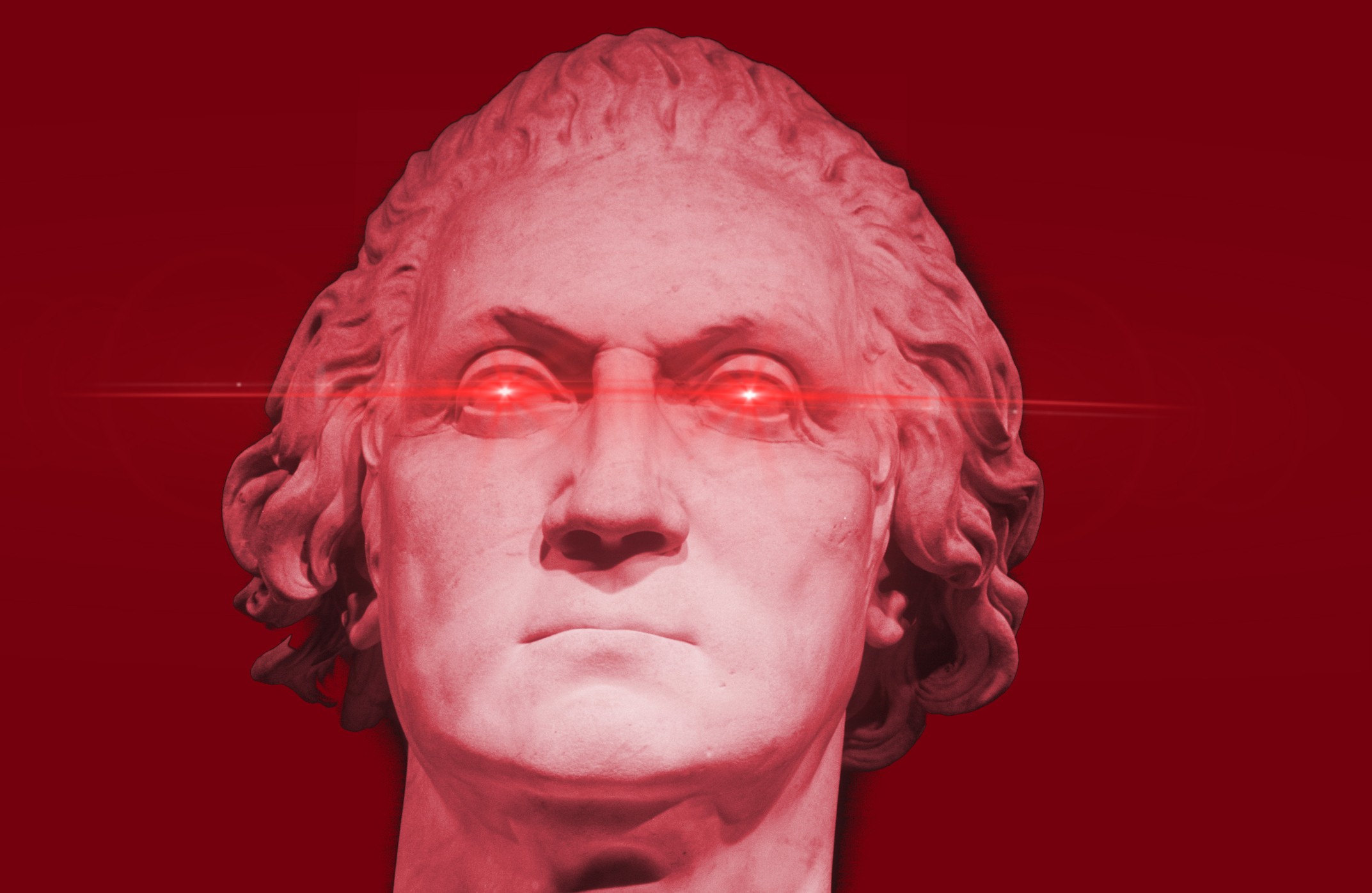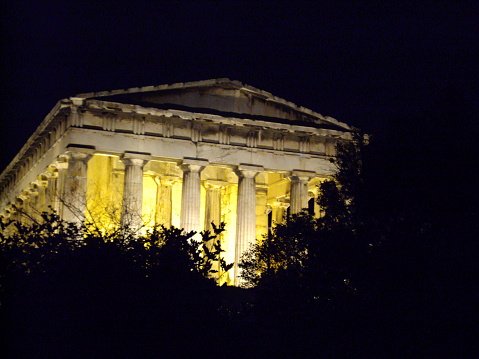America’s founding principles are not merely tried—they are true.
Chad Liberalism

Reason and revelation are united in our founding philosophy.
There’s a weightlifting joke made famous by eight-time Mr. Olympia Ronnie Coleman: “Everybody wants to be a bodybuilder, but nobody wants to lift no heavy-*ss weights.”
I thought of that while reading Yoram Hazony’s “Escaping Liberal Democracy,” which is full of amateur gym-bro wisdom about how America should get back in shape. But he seems to have skipped the hard work of lifting (and reading) the most important heavy books. Now, I don’t mean to suggest that one has to be an intellectual to see how our country has grown increasingly decrepit; nor am I defending credentialism. One should, however, at least be familiar with the key historical developments and major arguments about the founding and its critics before presuming to tell Americans how we should regain our political vigor.
Hazony seems to be a decent guy with good intentions. And along with many Americans, I share his desire to recover moral virtue and religious faith as central elements of self-government. But like the soy boy in the weight room who is convinced that he knows everything, Hazony exasperates his potential friends. His critiques of “liberalism” and his chimerical “conservative democracy” are mostly an incoherent hodge-podge of clichés, historical inaccuracies, and intellectual contradictions. I recognize that his essay here is adapted from a longer book; still it is noteworthy that he quotes not a single document or political figure to support his unusual arguments.
The Enlightenment “liberalism” Hazony decries at the beginning of his essay appears to be an exaggerated description of the founders’ social compact theory. Yet, unlike Patrick Deneen of Why Liberalism Failed fame, Hazony never explicitly condemns the founding. In fact, he later and rather inconsistently claims this objectionable liberalism is something “new” which “America and other Western nations” adopted within “the last 60 years.” Moreover, he invokes George Washington, John Adams, and Alexander Hamilton as proponents of his alternative vision. Presumably Hazony thinks he’s being prudent or magnanimous by painting the founders as his allies. Yet his effort to separate those American heroes from the “liberal” principles of equality and consent is a fool’s errand.
Hazony’s misconceived “solution” responds to an imaginary dilemma, because he (like Deneen, in this case) constructs a false dichotomy between Lockean natural rights theory and the moral habits of a decent society. Even a passing acquaintance with the founders’ major statements, however, will show that they saw no such contradiction:
“That no free government, or the blessings of liberty, can be preserved to any people, but by a firm adherence to justice, moderation, temperance, frugality, and virtue….”—Virginia Declaration of Rights, 1776.
“[T]he happiness of a people, and the good order and preservation of civil government, essentially depend upon piety, religion, and morality.”—Massachusetts Constitution, 1780.
Religion, morality, and knowledge, being necessary to good government and the happiness of mankind, schools and the means of education shall forever be encouraged.”—Northwest Ordinance, 1787.
“There is no truth more thoroughly established than that there exists in the economy and course of nature an indissoluble union between virtue and happiness.”—George Washington, First Inaugural Address, 1789.
The founders’ statesmanship combined reason and revelation, natural rights and the Bible. Hazony, keen to partition his subjects neatly into theoretical boxes, cannot recognize this. And so he is driven to rend asunder what the Declaration, and the founders more generally, put together under “the laws of nature and nature’s God.”
Our contemporary alienation from the framers’ moral and religious republicanism did not begin in the 1960s, as Hazony imagines. It originated with the progressive politicians and intellectuals of the late 19th and early 20th century. Woodrow Wilson, John Dewey, and their cohorts explicitly repudiated both the civic morality of self-government and what Dewey called “the rigid doctrine of natural rights” in the founding, planting in their place the seeds of our current bureaucratic despotism. Claremont-affiliated professors such as Tom West, John Marini, Charles Kesler, R.J. Pestritto, and Brad Watson have produced an impressive shelf of books detailing this transformation. Hazony, however, seems either unaware of, or uninterested in, this scholarship.
Ignoring this well-documented political history, Hazony gets himself tangled up in arguments that are unnecessarily complicated and confused. He is often unclear about the liberalism he is constantly attacking. “Liberals…have few, if any qualms about discarding the national and religious foundations of traditional Anglo-American government as unnecessary, if not simply contrary to universal reason.” Is he referring to 21st-century Democrats like Barack Obama? The problem there is that the liberalism of the last 60 years doesn’t actually endorse the “axioms” of liberalism he enumerates: universal rational truth, “the free and equal individual,” and the natural right of consent. The progressivism we are now facing abandoned all such commitments long ago, except as rhetorical window dressing. So perhaps Hazony is referring to 18th-century classical liberals like James Madison? Except Madison certainly did not believe religion was “contrary to universal reason.” So what is Hazony talking about? Beats me.
A State Religion? In This Environment?
Hazony’s practical judgments also are deeply amiss. His principal objection to the strawman liberalism he constructs is that it “makes no mention of God,” neglects “the binding character of Scripture,” and places “God, Scripture, family, congregation” outside the “liberal political system.” Setting aside the ever-present question of what liberalism he’s talking about, Hazony’s alternative “political tradition, rooted in the Bible” would vastly expand the reach of government. In the Republic of Hazonia, “the state upholds and honors God.” Keep in mind that this is his prescription for what we should do “now” to “restore as much as possible” a healthy society. Evidently, he wants the same people who have made an unofficial theology of “systemic racism” to be in charge of enforcing their interpretation of the Bible.
The American Founders were explicit that self-government depended on a moral and religious people, but they rejected direct government involvement in theological questions because they understood how that power could be misused. Haven’t those concerns been vindicated in the way our government today grossly abuses its secular powers to suppress unpopular opinions and freedom of conscience? I don’t know what the situation is like in Israel, where Hazony lives, but only a champion of woke tyranny would relish a state religion in the United States today.
I’m being so hard on Hazony because he really should know better. Many scholars over the years have corrected his errors in print, and I even witnessed first-hand a public discussion with Hazony at Hillsdale College’s Kirby Center in Washington, D.C. in 2018. The Center’s director Matthew Spalding, and Claremont Institute president Ryan Williams, patiently attempted to correct some of his most egregious misconceptions about America—patiently, but in vain.
Hazony thinks he’s smarter than the American Founders. If he agreed with them he would just say so; but then he wouldn’t have anything to sell in his book. So instead, he’s peddling his own patented elixir for political health. But just as in the gym, there really are no shortcuts to political vitality. It’s mostly a matter of knowing the fundamentals and putting in the work. James Madison, in Federalist #57, claimed that our constitutional republic would fall if the American people lost “the vigilant and manly spirit which actuates the people of America, a spirit which nourishes freedom, and in return is nourished by it.”
Of course, one can be both right and virtuous and still have no guarantee of success. Our political institutions are deeply corrupt, and it isn’t immediately clear whether or how we can rebuild them. That is a matter of practical judgment involving difficult prudential questions. But the fundamentals—the essential principles of republican government—remain the same, if we just take the trouble to understand them. Hazony’s false dichotomies, novel interpretations, and muddled thinking are a hindrance to that effort, not a help.
The American Mind presents a range of perspectives. Views are writers’ own and do not necessarily represent those of The Claremont Institute.
The American Mind is a publication of the Claremont Institute, a non-profit 501(c)(3) organization, dedicated to restoring the principles of the American Founding to their rightful, preeminent authority in our national life. Interested in supporting our work? Gifts to the Claremont Institute are tax-deductible.
Enlightenment rationalism cannot even deliver the goods it promises.
The pitfalls of conservatism without practical reason or natural law.
The Anglo-American alternative to fascism, Marxism, and enlightenment rationalism.




